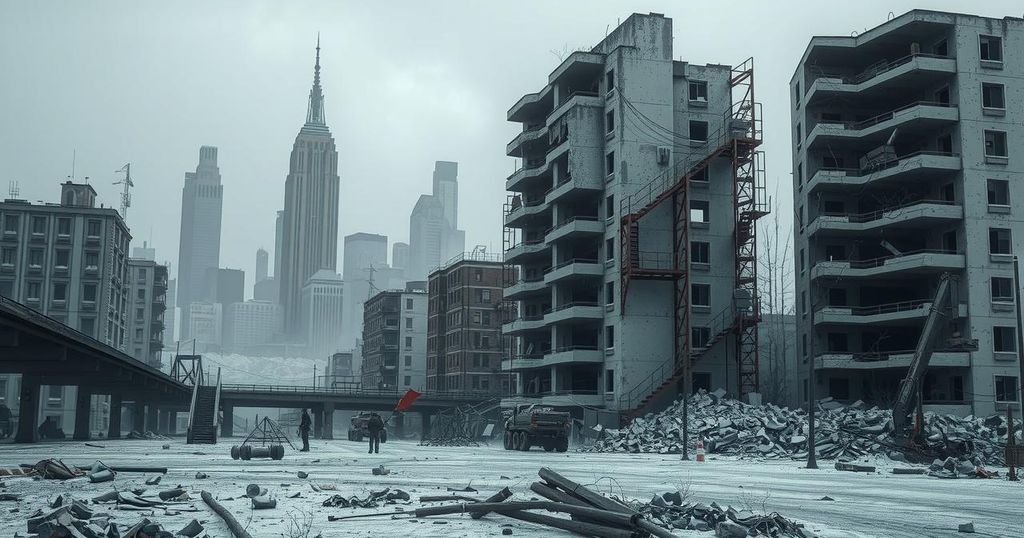The Ongoing Civil War in Sudan: A Comprehensive Analysis
Since April 2023, Sudan has faced a brutal civil war between military factions, leading to a severe humanitarian crisis with millions needing aid. External interference from various states has complicated the conflict, while unsuccessful peace talks have left civilians vulnerable. The situation demands urgent protective measures for the population and a reevaluation of international involvement in the conflict.
Since April 15, 2023, Sudan has been engulfed in a violent civil war, ignited by tensions between the two dominant military factions in the country. This conflict is rooted in a prolonged struggle for power regarding military integration and control. Initial skirmishes began in Khartoum, rapidly expanding to various regions of Sudan, with international peace efforts failing to yield significant results.
The ongoing civil unrest has precipitated one of the most severe humanitarian crises globally, affecting around 30 million Sudanese who are in dire need of assistance. Widespread violence, looting, and destruction have become routine, resulting in millions lacking essential medical services. The economic collapse and food shortages have further exacerbated the plight of the population.
Moreover, the conflict has sparked a significant displacement crisis, with over 14 million people fleeing their homes. Many have sought refuge in neighboring countries, while others remain trapped in perilous conditions within Sudan. The human cost of this conflict is staggering, with estimates of fatalities ranging from 20,000 to 62,000, though this number is likely much higher.
Initially, both military factions were well-armed, with Sudan being one of the most heavily armed nations in the region. Khristopher Carlson’s research indicates that, although the two factions employ different combat strategies, they are sufficiently equipped to sustain prolonged combat. The Sudanese Armed Forces benefit from a robust air force and heavy weaponry, while the Rapid Support Forces depend on agile units armed primarily with small weapons.
The situation is further complicated by external influences from states such as Chad, Egypt, Iran, Libya, Qatar, and Russia, each supporting different factions. Saudi Arabia and the United Arab Emirates particularly complicate matters, as they align with opposing leaders within Sudan’s security forces, intensifying internal rivalries. This external meddling creates a climate of competition and instability.
The involvement of these external stakeholders has repercussions beyond Sudan’s borders. The Sudanese army has accused the United Arab Emirates of supplying the Rapid Support Forces through Chad, leading to heightened tensions and threats of retaliatory action against Chad. Given Sudan’s borders with seven unstable nations, there are fears that further conflict could have grave economic, social, and political consequences for the region.
Currently, millions of civilians find themselves trapped in the conflict, facing extreme danger. A United Nations report from September 2024 recommended establishing an independent force to protect these civilians; however, this proposal has been rejected by Sudan’s authorities. There remains a dire need for a structured peacekeeping effort, as prior missions have exited without setting up any effective security framework for civilians.
Efforts to broker peace through high-level negotiations by the African Union and the UN have largely stalled, with talks in Switzerland and Jeddah yielding minimal impact. According to peace scholar Philipp Kastner, the competing interests of the nations involved in the negotiations have hindered impartiality and contributed to lack of progress. Continued military support to the conflicting parties will likely perpetuate the conflict, leaving civilians in enduring peril.
In summary, Sudan’s civil war has escalated into a profound humanitarian crisis, characterized by widespread violence, mass displacement, and international interventions that exacerbate internal divisions. Despite various efforts for peace, a lack of impartial support and continued external military assistance impede progress. The urgent need for a protective force for civilians remains paramount, as millions suffer the dire consequences of ongoing hostilities.
Original Source: theconversation.com








Post Comment